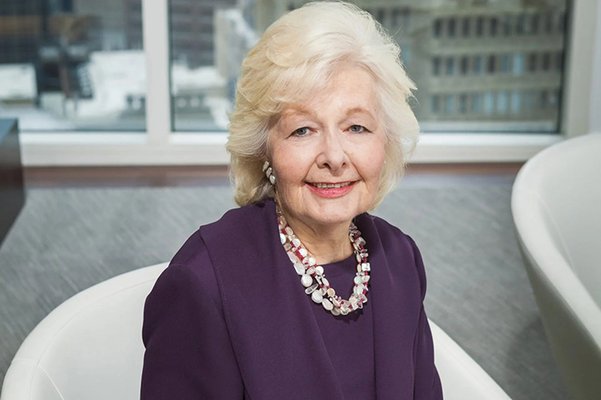Margaret H. Marshall to Receive Sandra Day O’Connor Award

Retired Massachusetts Chief Justice and ALI Council Emeritus Margaret H. Marshall has been selected as the 2024 winner of the prestigious Sandra Day O’Connor Award, the highest honor bestowed by The National Judicial College. Throughout her tenure, she not only advocated for judicial independence and the rule of law but also implemented multiple innovative solutions to enhance court operations. She is notably recognized for authoring the pioneering opinion Goodridge v. Department of Public Health, which declared a ban on same-sex marriage unconstitutional.
“Chief Justice Marshall is an exemplary jurist whose career epitomizes a steadfast commitment to justice, judicial independence, and the rule of law. Her leadership has not only transformed the judiciary of Massachusetts but also significantly impacted the national legal landscape,” said Hon. Benes Z. Aldana (Ret.), President and CEO of The National Judicial College. “Her achievements ranging from spearheading administrative reforms to authoring groundbreaking legal opinions, truly reflect the core values of our College: a deep commitment to justice, excellence in innovation, unwavering integrity, and engaged leadership. Chief Justice Marshall stands as a beacon of judicial excellence, carrying forward the legacy of Justice Sandra Day O’Connor in every sense.”
The award will be presented during the opening reception of the Appellate Judges Education Institute Summit on Thursday, November 14 at 6:30 p.m. at the Westin Boston Seaport District-Grand Ballroom.
“I am overwhelmed by this honor,” retired Chief Justice Marshall said. “I had the great privilege to know Justice O’Connor. She was, and remains, one of my judicial models. She was a great patriot, an outstanding jurist, and an exemplary public servant — before, during and after her tenure on our Nation’s highest court.”
A legacy of innovation
Appointed to the Massachusetts Supreme Judicial Court in 1996 and becoming its first female Chief Justice in 1999, Chief Justice Marshall has often been quoted referencing John Adams and the Massachusetts Declaration of Independence, emphasizing the right “to be tried by judges as free, impartial, and independent as the lot of humanity will admit.” Her initiatives to modernize the administration of the trial courts introduced accountability, transparency, and data-driven strategies that significantly reduced case backlogs and improved operational efficiencies across both trial and appellate courts.
Chief Justice Marshall also bolstered judicial evaluation, education, and mentoring as well as enhanced access to justice by providing support for self-represented litigants and modernizing court facilities to ensure accessibility and public education. Notably, under her leadership, the Massachusetts Supreme Judicial Court was among the first in the nation to livestream oral arguments.
A unique perspective on the rule of law and judicial independence
Originally from South Africa, Chief Justice Marshall bore witness to the injustices of apartheid. While the church she was raised in was devoted to ending apartheid and she learned much about the cause, it was not until she was a high school exchange student in the United States during the height of the Civil Rights Movement that she began to fully comprehend the issue.
“I tasted freedom for the first time when I came to the United States,” Chief Justice Marshall said. “We did not have television in South Africa. I read books here that I could not read there, including Cry, Thy Beloved Country, which is about South Africa, but banned there.”
Upon returning to South Africa for college, Chief Justice Marshall was elected president of the National Union of South African Students, at the time a leading anti-apartheid organization. Her predecessors were arrested, thrown out of the country, or banned, a type of house arrest. Knowing her political activities left her vulnerable, she came to the United States to pursue her master’s degree at Harvard University.
“I had not planned to attend law school. The very idea of being a lawyer had not entered my mind: in South Africa law was an instrument of oppression, the rule of law was a rule of the powerful. Nothing attracted me to the legal profession,” she said. “I came to understand the law plays a unique role in this nation. I saw lawyers bring cases that gave meaning to the words of Dr. Martin Luther King and Senator Robert Kennedy that had so moved me. I understood that law need not be an instrument of dehumanization. Law could be a means to freedom, equality and justice for all.”
She earned a law degree from Yale University and became a United States citizen in 1978. She began her legal career in private practice in Boston and served as president of the Boston Bar Association. She served as Vice President and General Counsel of Harvard University before her appointment to the Supreme Judicial Court.
Throughout her career, Chief Justice Marshall has advocated strongly for the rule of law and judicial independence.
“Our courts enforce our written Constitution and they are critical to a living democracy,” she said. “Many Americans do not know — or are not taught — that the United States Constitution embodies an entirely unique and brilliant structure of government. For so long no other country had what we have, which is a written charter of rights for each person that our government cannot take away. A written bill of enforceable rights was unique in the United States from 1787 until 1948, when Germany adopted its charter after the second world war. The ability of judges to be impartial in their judgments, and to be independent of political and popular pressure is essential of our Constitutional Democracy.”
Chief Justice Marshall was selected as the 2024 winner of the Sandra Day O’Connor Award from a large pool of nominees with highly distinguished backgrounds.
Previous winners of the Sandra Day O’Connor Award include retired Judge Bernice Donald of the United States Court of Appeals for the Sixth Circuit, Senior U.S. District Court Judge Rya Zobel, who serves on the United States District Court for the District of Massachusetts, and the late Justice Sandra Day O’Connor herself.
